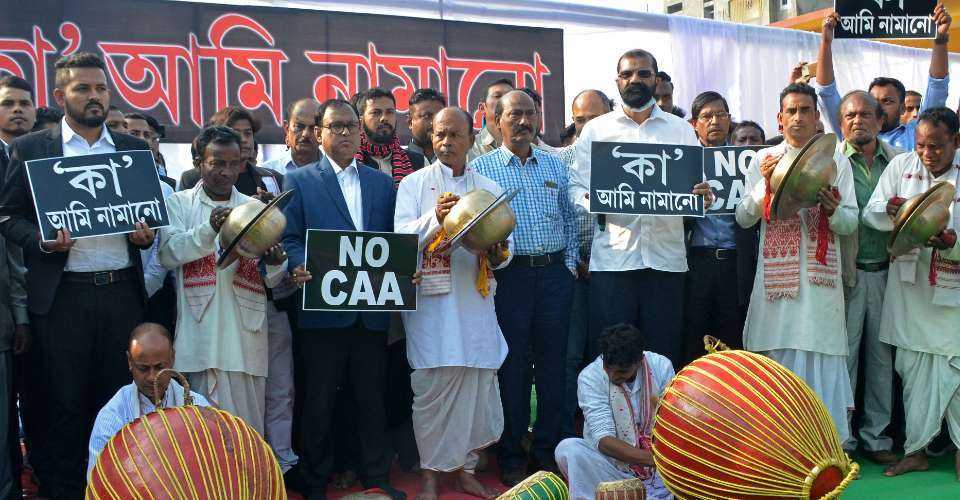
Religion is set to be the prime emotive factor in India’s national election expected to be held between April and May this year. Prime Minister Narendra Modi is already in campaign mode, seeking a third consecutive term with a bigger mandate for his pro-Hindu Bharatiya Janata Party (BJP).
His government on March 11 announced the enforcement of the controversial Citizenship (Amendment) Act (CAA), more than four years after it was passed in parliament, ignoring criticism from opposition parties.
The law aims to give citizenship to “persecuted” religious minorities from Afghanistan, Pakistan and Bangladesh, who entered India before December 2014. It lists Hindus, Christians, Parsis, Sikhs, Buddhists, and Jains as minorities, but conspicuously omits Muslims.
Hardly any religionists other than Hindus from neighboring nations take refuge in India.
Modi’s government intends to give a “permanent address” to these persecuted Hindus from the three Muslim-dominated nations.
Critics of the law say it excludes Muslims who migrated to India, mainly from Bangladesh. There are some 1 million Bangladeshi Muslims, 90 percent of them living in Indian states bordering that country.
They will not be welcome in India and will be either deported or rendered stateless. Hence, Muslim groups and rights bodies have opposed the implementation of the law.
Massive protests were witnessed at the time of the CAA’s passing in December 2019 forcing the Modi government to delay formulating the rules for implementation.
Angry protests in the national capital New Delhi and sensitive border states like Assam leading to clashes between opponents and supporters of the law left hundreds injured.
Some supporters believe announcing its implementation ahead of the national election is “a political masterstroke.”
“It will help pro-Hindu and anti-Muslim polarization in sensitive states such as West Bengal bordering Bangladesh,” feels Ramakanto Shanyal, a political observer based in the eastern state.
But he warned that “it could also prove a double-edged sword” by reigniting violence during polls.
Congress leader Adhir Ranjan Chowdhury told UCA News that the move is “a ploy to polarize Hindus.”
“Otherwise, why did the Modi government take four years to enact the rules,” he asked.Global rights groups have been critical of the law.
Human Rights Watch has called it “discriminatory” because religion is being made “a basis for granting citizenship” for the first time in India.
Pinarayi Vijayan, the communist chief minister of southern Kerala state said his government will not implement the law.
BJP leaders remained unfazed. “It’s a historic day…,” said Shantanu Thakur, a federal junior minister for ports, shipping and waterways in the Modi cabinet.
Thakur who is a leader from the Matua Hindu community and hails from West Bengal, said he was “more than happy” that the law was coming into force “in my lifetime.”
“Three generations from my community have suffered untold miseries and harassment as there was no law giving us adequate legal protection,” he said.
The Matua community is a backward Hindu caste, tracing their ancestry to Bangladesh.
They will celebrate March 11 as their “second independence day” since the CAA will benefit them.
The community, with an estimated population of three million, can be a determining factor in the elections in West Bengal. It can tilt the scales in some parliamentary constituencies.
Another federal junior minister for home affairs Nisith Pramanik told reporters that the law will help everyone who was “forced to leave their homes due to religious persecution” before 2014.
He, however, clarified that it was not aimed at “persecuting any single individual or group.”The critics of the law “are misleading people,” he alleged.
Interestingly, doubts have been raised about the nationality of Pramanik, who represents the Cooch Behar parliamentary constituency in West Bengal.
Ripun Bora, a Congress parliamentarian, who raised the question, alleged that the minister is a Bangladeshi national.
Federal Home Minister Amit Shah, a confidante of Modi, said the law aims to “give citizenship” and is not meant “to take away anyone’s citizenship” in an oblique reference to apprehensions that Muslims will be harassed under the CAA.
Minority rights groups fear the law will not give Muslims the “same rights to citizenship” as members of other faiths.
This, according to them, undermines India’s secular constitution.
BJP leaders argue that Pakistan, Afghanistan, and Bangladesh are Muslim-majority countries, hence Muslim nationals from there cannot be treated as persecuted minorities.
The timing of the CAA’s implementation hints at Modi’s and the BJP’s hopes of making electoral gains in the northeastern region, particularly in West Bengal and Assam, where illegal Muslim migrants from Bangladesh have been a divisive issue for decades.
More than 10 percent of India’s 543 parliamentary constituencies are in West Bengal (42 seats) and Assam (14 seats).
Hindu groups in these border states have been campaigning against the inflow of Muslims from Bangladesh.
In the 2019 national election, the BJP won 18 seats in West Bengal and nine seats in Assam.
Modi told his party workers in West Bengal that they should try to win all 42 seats.
In Assam, Chief Minister Himanta Biswa Sarma of the BJP said his party may have to pay a political price for the latest move.
Most opposition to the citizenship law in 2019 came from Assam.
Still, Sarma said there can be “no doubt or second thought” about supporting the CAA.
Modi has made a bold decision to stay in power. He has brought religion into politics, much to the chagrin of the so-called secularists and human rights activists.
source : ucanews
